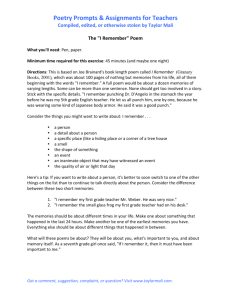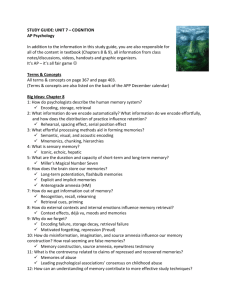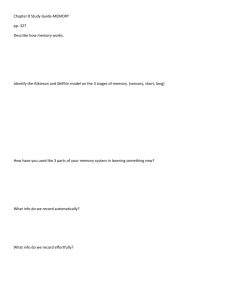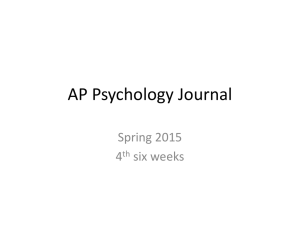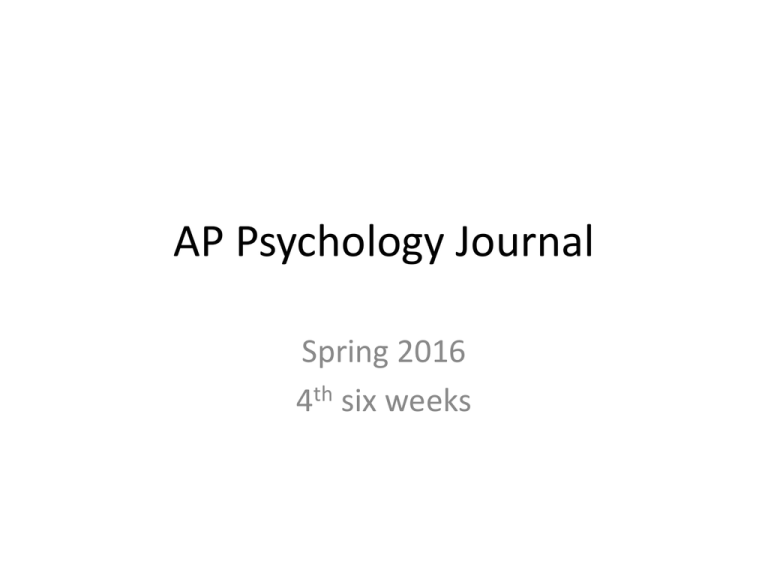
AP Psychology Journal
Spring 2016
4th six weeks
Today’s lesson 1/5/2016 B day;
WELCOME BACK! 1/6/2016 A day
Course syllabus; Handout
Memory case study assignment due 1/18 turnitin.com
TODAY’s LESSONS
• Memory charade
• Journal prompt: Pervasive role of memory
• Lesson: Theories of Memory
• Lesson Review: Categorizing Different types of Memories
• Video:
– Understanding the Mysteries of Memory, part I.
– Take notes for research paper
– No other work during the video!
Memory charade
• Solve the word or phrase handed to you.
• Design a short demonstration for students to
guess your topic sentence, as in charades.
– Visual such as drawing
– Short skit (with a classmate to help if needed)
• Class presentation of topics next two class
periods.
Memory activity
• Write in your journal the answers to the
questions the teacher asks.
Memory Activity
Snow White and the 27 Dwarves
•
•
•
•
•
•
•
•
•
Grouchy
Gabby
Fearful
Sleepy
Smiley
Jumpy
Hopeful
Shy
Droopy
•
•
•
•
•
•
•
•
•
Dopey
Sniffy
Wishful
Puffy
Dumpy
Sneezy
Lazy
Pop
Grumpy
•
•
•
•
•
•
•
•
•
Bashful
Cheerful
Teach
Shorty
Nifty
Happy
Doc
Wheezy
Stubby
Journal Prompt 1/5/2016
Learning
Objective
3.3 Discuss
the factors
influencing
how
memories
are retrieved.
Journal prompt:
Write down three things you did
yesterday that did NOT involve memory.
Overview of the multisystem model of
memory
I. Traditional theories of memory
A. Information Processing model: memory
storage compared to computer
1. Encoding
2. Storage
3. Retrieval
Studying Memory:
Information Processing Models
Keyboard
(Encoding)
Disk
(Storage)
Sequential Process
Monitor
(Retrieval)
8
Overview of the multisystem model of
memory
I. Traditional theories of memory
B. Three stages of memory Atkinson & Shiffrin
(1968)
1. Sensory
2. Short-term memory
3. Long-term memory
Information Processing
Frank Wartenberg/ Picture Press/
Corbis
Bob Daemmrich/ The Image Works
Bob Daemmrich/ The Image Works
The Atkinson-Schiffrin (1968) three-stage model
of memory includes a) sensory memory, b)
short-term memory, and c) long-term memory.
10
Modifications to the Three-Stage
Model
1.
2.
Some information skips the first two stages and
enters long-term memory automatically.
Since we cannot focus on all the sensory
information received, we select information that
is important to us and actively process it into our
working memory.
A newer understanding of short-term memory
that involves conscious, active processing of
incoming auditory and visual-spatial
information, and of information retrieved from
long-term memory.
11
Overview of the multisystem model of
memory
II. Modern theory of memory: Memory is a collection of
systems working independently of one another
A. Types of Memory
1. Declarative
2. Non-declarative
B. Evidence
1. People with damage to brain showing patterns of
amnesia still have a working memory and nondeclarative memory.
2. People have impairments in episodic memory, but not
semantic memory.
“Understanding the Mysteries of
Memory” Discovery Learning (1996)
• implicit and explicit
memory
• savant syndrome
• traumatic memory
• short term memory loss
• long term memory loss
• flashbacks
• “flashbulb memories"
• mistaken identification
• suggested memories
• trauma induced amnesia
• Alzheimer’s disease
Memory alternative video
This is a program about memory failures using real case
studies. Also, you may watch the alternative video for case
studies.
Assignment: DUE DATE: Turnitin.com by midnight Saturday
1/16.
• Write an essay about one of the conditions discussed in
the film. WRITE ABOUT ONLY ONE CONDITION!!!
• Use the individual’s name and describe specific situations
of memory failure encountered by the individual.
• What do scientists believe is the cause of the memory
failure?
• Use your text and academic sources to supplement your
understanding of the memory condition.
• Conclude with your personal reaction to the case study.
Length:5 well-written paragraphs
Cite sources internally and in bibliography.
All original work, please.
AP Psychology Lesson 1/7/2016
• Journal prompt: Deep processing
• Charades on Memory notes
• Finish video “Understanding the Mysteries of
Memory”
After notes
• Notes: Biological Basis of Memory
• Attention: Vocabulary Quiz 1/11; 1/12
– Encoding and Storage
– Pages 327-345
Journal prompt: 1/7/2016; 1/8/2016
1.2 Characterize the difference between
shallow (surface) and deep (elaborate)
processing.
Image source: http://cogsci.stackexchange.com/
What are the advantages
of visual, acoustic, and
semantic encoding?
Which allows the deepest
processing?
How can we incorporate
these methods of
encoding into our study
practice?
AP Psychology Journal prompt
1/11/2016; 1/12/2016
2.2 Identify and explain
biological processes
related to how memory is
stored.
p. 340-341
In their experiments with
sea slugs, what did Kandel
and Schwartz learn about
the neural basis of
learning?
How does the brain store our
memories?
• Old idea of flashbacks triggered by brain stimulation
• Loftus’ research (1980) refuted
• Lashley’s research (1950) did not find cortical
localization of memory The brain
• Synaptic changes
– Long Term Potentiation LTP
• Stress and hormones
• Hippocampus
• Cerebellum
Synaptic Changes
Both Photos: From N. Toni et al., Nature, 402, Nov. 25 1999. Courtesy of Dominique Muller
Long-Term Potentiation
(LTP) refers to synaptic
enhancement after
learning (Lynch, 2002).
An increase in
neurotransmitter release
or receptors on the
receiving neuron
indicates strengthening
of synapses.
19
Stress Hormones & Memory
Heightened emotions (stress-related or
otherwise) make for stronger memories.
Flashbulb memories are clear memories of
emotionally significant moments or events
Scott Barbour/ Getty Images
20
Storing Implicit & Explicit Memories
Explicit Memory refers to facts and experiences that one
can consciously know and declare. Implicit memory
involves learning an action while the individual does not
know or declare what she knows.
21
Hippocampus
Hippocampus – a neural center in the limbic
system that processes explicit memories.
Weidenfield & Nicolson archives
22
Anterograde Amnesia
After losing his hippocampus in surgery, patient
Henry M. (HM) remembered everything before the
operation but cannot make new memories. We call
this anterograde amnesia.
Anterograde
Amnesia
(HM)
Memory Intact
No New Memories
Surgery
23
Implicit Memory
HM is unable to make new memories that are
declarative (explicit), but he can form new
memories that are procedural (implicit).
A
B
C
HM learned the Tower of Hanoi (game) after his surgery. Each time
he plays it, he is unable to remember the fact that he has already
played the game.
24
Cerebellum
Cerebellum – a neural center in the hindbrain
that processes implicit memories.
25
AP PSYCHOLOGY LESSON
• 2 Journal Prompts:
– déjà vu
– Eyewitness testimony
• Videos “The Brain”
• Memory Notes
• Quiz Encoding & Storage P. 327-345
Deja Vu by Crosby Stills Nash & Young
AP Psychology Journal prompt, 1/14,
1/15
• 3.3 Discuss the factors
influencing how
memories are retrieved.
p. 348
What are three explanations
for why our memory system
might produce déjà vu?
Déjà Vu
Déjà Vu means “I've experienced this before.”
Cues from the current situation may
unconsciously trigger retrieval of an earlier
similar experience.
© The New Yorker Collection, 1990. Leo Cullum from
cartoonbank.com. All Rights Reserved
28
AP Psychology Lesson 1/14
• Journal Prompt: Retrieval
• True/False Chapter 8
• Eyewitness testimony
– Innocence Project
• How to study effectively
Journal prompt: 1/14; 1/15
Learning Objective
Students are able to
explain how memories
can be malleable.
• P. 361
• What techniques should
interviewers use to
ensure accurate
eyewitness testimony
from children?
• Journal prompt studying
Memory
how to study effectively





